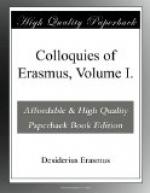[Footnote E: Lit.: One stained or smeared: an epithet of Bacchus (Dionysos) in Sicily, “smeared with wine-lees.” ([Greek: morysso].)]
This doubtless he holds to be an Imperial edict, that he with raging insolence of tongue should rave at whomsoever he pleases. Thus does this wise and weighty man support the interests of the orthodox faith. This is not a zeal of God, to hurt the harmless; but it is a rage of the devil. The Jewish zeal of Phinehas was once extolled, but not that it might pass as a pattern with Christians. And yet Phinehas openly slew impious persons. To your colleague whatever he hates is Lutheran and heretical. In the same way, I suppose, he will call small-beer, flat wine, and tasteless broth, Lutheran. And the Greek tongue, which is his unique aversion,—I suppose for this reason, that the Apostles dignified it with so great an honour as to write in no other,—will be called Lutheran. Poetic art, for he hates this too, being fonder of the potatic, will be Lutheran.
He complains that his authority is lessened by our means, and that he is made a laughing-stock in my writings. The fact is, he offers himself as an object of ridicule to all men of education and sense; and this without end. I repel slander. But if learned and good men think ill of a man who directs a slander at one who has not deserved it, which is it fair to consider the accountable person, he who rightly repels what he ought not to acknowledge, or he who injuriously sets it afoot? If a man were to be laughed at for saying that asses in Brabant have wings, would he not himself make the laughing-matter? He cries out that the whole of Luther is in my books, that on all sides they swarm with heretical errors. But when those who read my writings find nothing of the kind, even if ignorant of dialectics, they readily infer the true conclusion. He has authority from the Emperor. Let him therefore conduct himself in the spirit of the Emperor, who would rather that wrong-doers should be cured than punished, and certainly does not desire that the harmless should be injured. He has entrusted this function to a man he did not know; when he shall have ascertained the fellow’s character, he will doubtless recall what he has entrusted. It is not the disposition of the mildest of Emperors, nor of the most upright of Popes, that those who spend their night-watches in studying how to adorn and assist the State, should be exposed to the spite of such men; even although there were some human infirmity in the case. So far are they from desiring to estrange good and honest men, and force them to take a different side.




